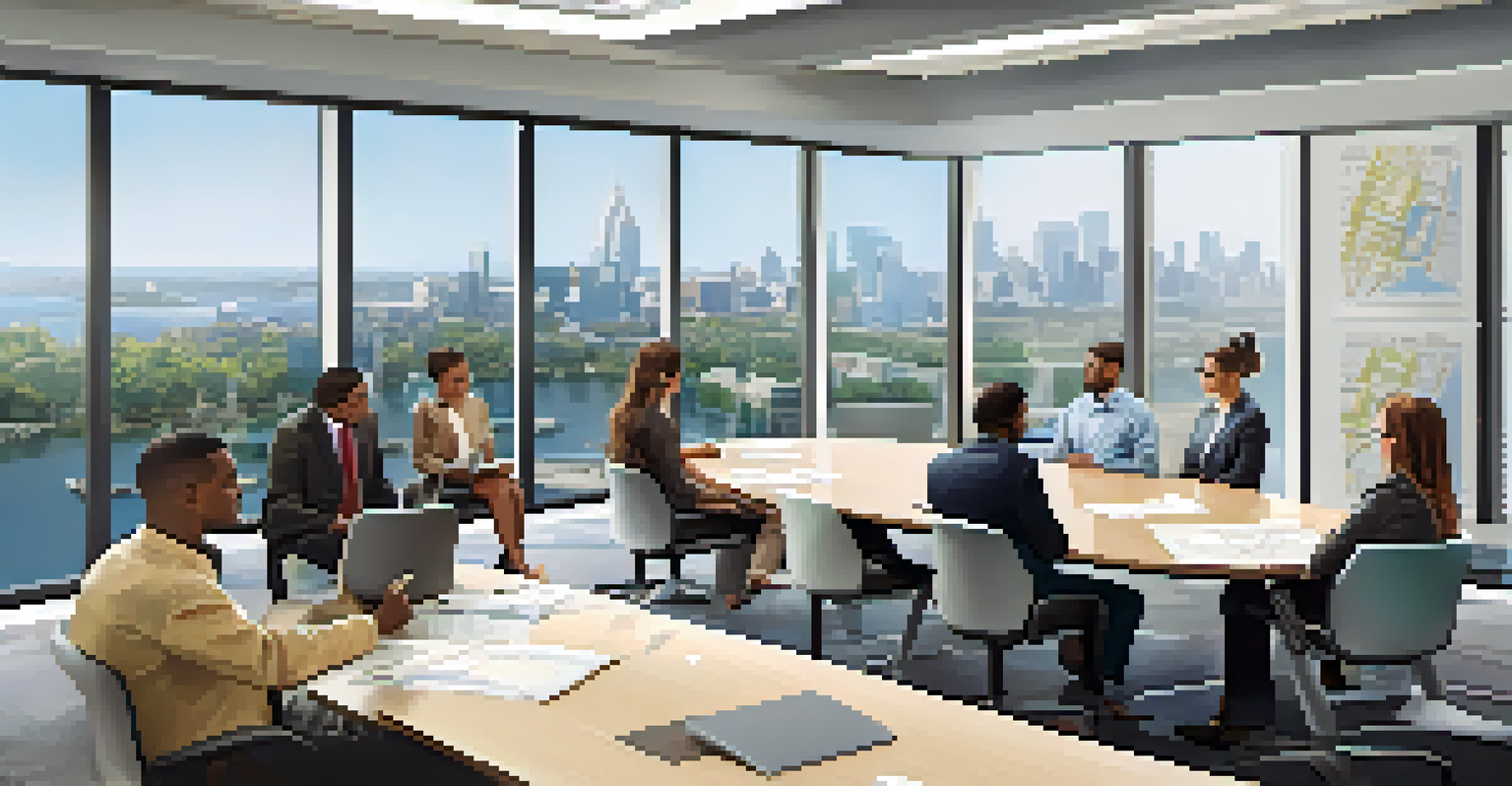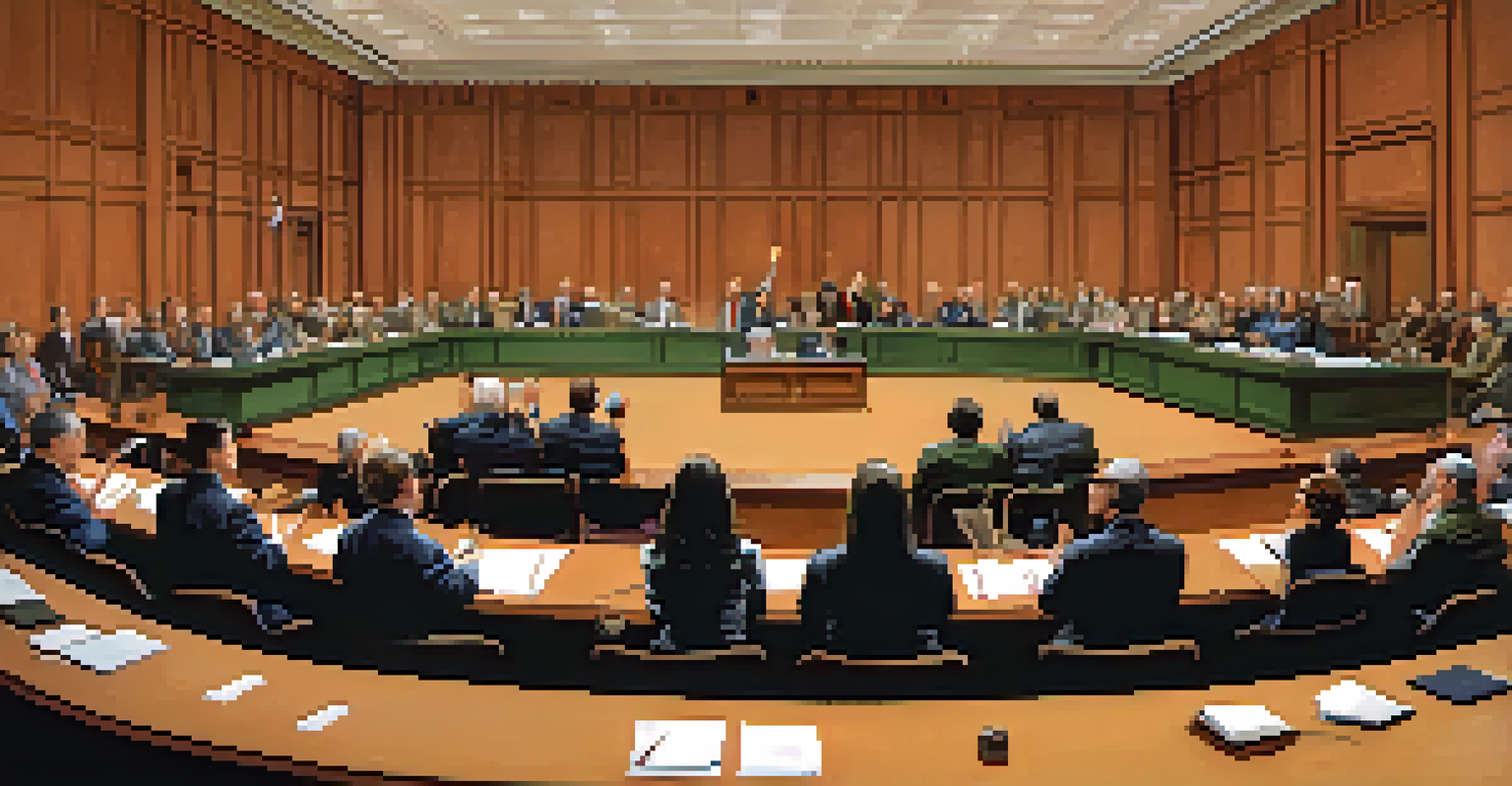Zoning Laws: A Guide to Special Use Permits

Understanding Zoning Laws: The Basics
Zoning laws are regulations governing how land can be used in certain areas. They dictate what types of structures can be built, how they can be used, and what activities are permitted. Essentially, these laws help maintain a community's character and ensure that land is used effectively and safely.
Zoning laws are the backbone of urban planning; they dictate how land can be used and help preserve the character of communities.
For instance, residential zones may only allow homes, while commercial zones permit businesses. This separation prevents a factory from being built next to a quiet neighborhood, ensuring a peaceful living environment. Understanding these basic principles is crucial for anyone looking to develop or invest in property.
Zoning laws can vary widely from one municipality to another, making local knowledge vital. Therefore, it's important to consult local zoning ordinances to understand the specific regulations that apply to your area.
What Are Special Use Permits?
Special use permits are exceptions to the general zoning laws that allow land to be used in ways not typically permitted by the existing zoning. These permits are often granted for specific projects that may benefit the community, such as schools or parks in residential areas. Essentially, they provide flexibility within the zoning framework.

For example, if a community wants to build a new school in a residential zone, they might apply for a special use permit. This allows the educational institution to operate in an area where schools are not typically allowed, fostering community growth while adhering to zoning regulations.
Zoning Laws Define Land Use
Zoning laws regulate how land can be used, ensuring that different areas maintain their intended character and function.
Obtaining a special use permit usually involves a public hearing and review by zoning boards or planning commissions. This process ensures that the proposed use aligns with community interests and zoning goals.
The Application Process for Special Use Permits
Applying for a special use permit can seem daunting, but understanding the process can demystify it. First, applicants typically need to submit a detailed proposal outlining the intended use of the property and how it meets the criteria for a special use. This proposal often includes site plans, environmental assessments, and other relevant documentation.
Public participation is essential in the planning process; it ensures that development reflects the community's needs and desires.
Next, a public hearing is usually scheduled, allowing community members to voice their support or concerns. This feedback is vital as it helps local authorities gauge public sentiment and consider how the proposed use might impact the neighborhood.
Finally, the zoning board or planning commission reviews all information, including public input, before making a decision. Depending on the outcome, the permit may either be granted, denied, or approved with specific conditions.
Criteria for Granting Special Use Permits
When considering special use permit applications, authorities evaluate several criteria to ensure the proposed use is appropriate. These criteria often include compatibility with surrounding properties, adherence to zoning regulations, and the potential impact on the community and environment. Understanding these factors can help applicants tailor their proposals for better chances of approval.
For example, if a developer wants to build a commercial facility in a residential area, they must demonstrate how this facility will be beneficial and not disruptive. This might involve showcasing traffic studies, plans for landscaping, or community benefits, such as job creation.
Special Use Permits Offer Flexibility
Special use permits allow exceptions to zoning laws, enabling specific developments like schools or parks in non-traditional zones.
Ultimately, the goal is to ensure that the proposed use aligns with the community's needs and zoning objectives. It's about finding a balance between development and maintaining the integrity of the neighborhood.
Common Examples of Special Use Permits
Special use permits can cover a wide array of uses, each tailored to specific community needs. Some common examples include places of worship, schools, daycare centers, and community centers. These uses often require special consideration due to their impact on the surrounding area.
For instance, a church might seek a special use permit to operate in a residential neighborhood. While this use may not typically be allowed, the community might benefit from the social services provided, warranting an exception.
Another example is a small business wanting to operate in a residential area. By applying for a special use permit, the business can address potential concerns, such as noise and traffic, while contributing to the local economy.
The Importance of Public Input
Public input plays a crucial role in the special use permit process. Community members often have the opportunity to express their opinions during public hearings, allowing them to voice concerns or support for the proposed use. This feedback is invaluable for decision-makers as they assess the potential impact on the neighborhood.
For instance, if a new business is proposed for a residential area, local residents might raise issues about increased traffic or noise. This input can lead to modifications in the proposal or additional conditions attached to the permit to alleviate concerns.
Public Input Shapes Permit Decisions
Community feedback during public hearings is crucial in the special use permit process, influencing the approval and conditions of proposed projects.
Encouraging community involvement not only fosters transparency but also helps ensure that developments align with the community's vision and needs. It’s a collaborative effort that can lead to better outcomes for everyone involved.
Navigating Challenges with Special Use Permits
Navigating the special use permit process can present challenges, but being prepared can make a difference. Applicants may encounter opposition from community members, lengthy review processes, or additional requirements that complicate their plans. Anticipating these challenges and addressing them proactively is essential.
For instance, if community opposition arises, engaging with local residents beforehand can help alleviate concerns. Open dialogue about the project’s benefits and addressing potential drawbacks can lead to greater acceptance.

Additionally, working closely with local authorities and understanding their expectations can aid in streamlining the process. Clear communication and flexibility can often transform potential roadblocks into stepping stones toward successful project approval.